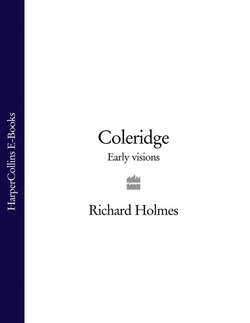Читать книгу Coleridge: Early Visions - Richard Holmes - Страница 28
4
ОглавлениеHis second year at Jesus College was certainly an active one. Exams, university politics, drinking, debts, and a growing infatuation with Mary Evans, all swept him in a ceaseless whirlpool of pleasures and anxieties. Though later he would characteristically say: “I became a proverb to the University for Idleness.”21
His academic targets were probably far too ambitious, particularly now that his mentor Middleton had left Pembroke (without obtaining the expected Fellowship). His fellow undergraduates at Jesus were largely taken up with the cause célèbre of their radical tutor William Frend, who was tried in the Senate for religious blasphemy. Coleridge became a chief organiser of the Frend faction,* and by 1793 his rooms were a renowned centre both for political and literary discussions held long into the night.
Val Le Grice’s brother, Charles (the inimitable Val had lost his Exhibition because of drunkenness, evidently a Grecian weakness), decorously recalled what were obviously rowdy and undecorous sessions with Coleridge in full flow. “What evenings I have spent in those rooms!…when Aeschylus, and Plato, and Thucydides were pushed aside, with a pile of lexicons etc, to discuss the pamphlets of the day. Ever and anon, a pamphlet issued from the pen of Burke. There was no need of having the book before us. Coleridge had read it in the morning, and in the evening he would repeat whole pages verbatim.”22
Vendettas were also pursued against the more conservative Jesus dons. Coleridge told Mary Evans of his taunting of Mr Newton their Mathematics Tutor, even to the point of harassing the tutor’s doctor who had been so unwise as to treat him for a fever that had conveniently prevented him lecturing: “six of his duteous pupils, myself as their General, sallied forth to the Apothecary’s house with a fixed determination to thrash him for having performed so speedy a cure – but luckily for himself the Rascal was not at home.”23 Slogans such as “Frend and Liberty” were daubed on the college walls, and at the height of the agitation even burnt in gunpowder on the sacred turf of Trinity College quadrangle.
Amidst these stirring events, and the increasingly exciting despatches from Paris, Coleridge sat for his exams and prizes. In December he was selected by Professor Porson as one of the seventeen undergraduates in the university to take the prestigious Craven Scholarship, and by January 1793 was in the last four finalists. “We circumnavigated the Encyclopaedia – so very severe an examination was never remembered.” In April he sat again for the annual Rustat Exams, and in June again competed for the Brown Medal – submitting a Greek Ode on Astronomy.
His results were not undistinguished, though clearly his family were disappointed. The Rustat Scholarship was renewed, and he came second in the Brown Medal (the winner was Keate, subsequently Shelley’s headmaster at Eton, the notorious “Flogger” Keate). The Craven was given to the youngest finalist, Christopher Bethell, who later became Bishop of Bangor. But the Master of Jesus, Dr Pearce, was so pleased with Coleridge’s performance that he awarded him the college “Chapel Clerk’s Place”, which brought him a further £33 per annum towards his expenses. It also required Coleridge – for Pearce was a shrewd man – to attend chapel at least four mornings a week, no doubt intended as a check on his nocturnal activities.
For several weeks after the effort of the Craven, he was confined to his rooms with an abscessed tooth, and wrote a teasing series of letters to Mary. One, enclosing a spirited imitation of Ossian’s poetry, concluded: “Are you asleep, my dear Mary? – I have administered rather a strong Dose of Opium –: however, if in the course of your Nap you should chance to dream, that – I am with the ardour/of fraternal friendship/Your affectionate S. T. Coleridge – you will never have dreamt a truer dream in all your born days.”24
